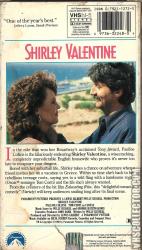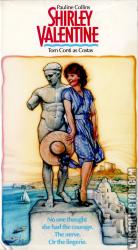Shirley Valentine
Catalog Number
32248
-
Primary Distributor (If not listed, select "OTHER")
Catalog Number
32248
Primary Distributor (If not listed, select "OTHER")
Release Year
Country
108 mins (NTSC)
N/A | N/A | N/A
N/A | N/A
Shirley Valentine (1989)
Additional Information
Additional Information
No one thought she had the courage. The nerve. Or the lingerie.
Since its London and Broadway stage debut, playwright Willy Russell's Shirley Valentine has proven an excellent showcase for any number of talented actresses (Loretta Swit won the 1989 Sarah Siddons Award for her work in the Chicago production). In the film version of Shirley Valentine, Pauline Collins re-creates the role that had previously brought her theatrical fame and a Tony Award. Spending the bulk of the film speaking directly to the audience, the titular Shirley (Collins), a middle-aged Liverpool housewife, reveals her innermost thoughts and fears in a manner that is both insouciant and poignant. Once an incorrigible anti-establishment rebel, Shirley now chafes under the plodding insensitivity of her husband, Joe (Bernard Hill). Her life enters a new and exciting phase when, after her best friend, Jane (Alison Steadman), wins an all-expenses-paid vacation to Greece, Shirley is given the opportunity to travel to faraway places without her husband. Shirley Valentine represents the second felicitous collaboration between playwright Willy Russell and director Lewis Gilbert; the first was Educating Rita (1983).
Caryn James of The New York Times observed, "By adding all the characters and settings that Shirley only talks about on stage, the film reveals the weakness of Mr. Russell's script as surely as if a magician's clumsy assistant had pointed a finger at a secret trapdoor. Ms. Collins brings as much energy and warmth to the role as ever, but on screen the strength of her performance is shattered by being chopped into tiny, disconnected bits."[1]
Roger Ebert of the Chicago Sun-Times rated the film one star, calling it "a realistic drama of appalling banality." He added, "There were moments during the movie when I cringed at the manipulative dialogue as the heroine recited warmed-over philosophy and inane one-liners when she should have been allowed to speak for herself . . . Many of the sentiments in this film seem recycled directly from greeting cards . . . If there is a shred of plausibility in the film, it comes from Bernard Hill's performance as Shirley Valentine's husband. He isn't a bad bloke, just a tired and indifferent one, and when he follows his wife to Greece at the end of the film there are a few moments so truthful that they show up the artifice of the rest." [2]
Jow Brown of the Washington Post called the film "an uncommonly warm, relaxed little movie . . . without a cloying artificially-sweetened aftertaste." He continued, "The story's a bit of romantic whimsy, but it affords a great many comfortable and comforting laughs, and may even serve as a wake-up call for some." [3]
Variety called the film "uneven but generally delightful" and Pauline Collins "irresistible." [4]
Radio Times rated the film four out of five stars and added, "Lewis Gilbert manages to retain the best of Willy Russell's theatrical devices . . . while opening out the action to embrace a big-screen atmosphere. The supporting cast, particularly Bernard Hill as Collins's Neanderthal husband, is equally convincing, with only the hammy Conti (glistening teeth and appalling accent) striking a momentary false note."
Release Date: August 28, 1989
Distrib: Paramount
Boxoffice: $6,056,912 2013: $12,281,700
Since its London and Broadway stage debut, playwright Willy Russell's Shirley Valentine has proven an excellent showcase for any number of talented actresses (Loretta Swit won the 1989 Sarah Siddons Award for her work in the Chicago production). In the film version of Shirley Valentine, Pauline Collins re-creates the role that had previously brought her theatrical fame and a Tony Award. Spending the bulk of the film speaking directly to the audience, the titular Shirley (Collins), a middle-aged Liverpool housewife, reveals her innermost thoughts and fears in a manner that is both insouciant and poignant. Once an incorrigible anti-establishment rebel, Shirley now chafes under the plodding insensitivity of her husband, Joe (Bernard Hill). Her life enters a new and exciting phase when, after her best friend, Jane (Alison Steadman), wins an all-expenses-paid vacation to Greece, Shirley is given the opportunity to travel to faraway places without her husband. Shirley Valentine represents the second felicitous collaboration between playwright Willy Russell and director Lewis Gilbert; the first was Educating Rita (1983).
Caryn James of The New York Times observed, "By adding all the characters and settings that Shirley only talks about on stage, the film reveals the weakness of Mr. Russell's script as surely as if a magician's clumsy assistant had pointed a finger at a secret trapdoor. Ms. Collins brings as much energy and warmth to the role as ever, but on screen the strength of her performance is shattered by being chopped into tiny, disconnected bits."[1]
Roger Ebert of the Chicago Sun-Times rated the film one star, calling it "a realistic drama of appalling banality." He added, "There were moments during the movie when I cringed at the manipulative dialogue as the heroine recited warmed-over philosophy and inane one-liners when she should have been allowed to speak for herself . . . Many of the sentiments in this film seem recycled directly from greeting cards . . . If there is a shred of plausibility in the film, it comes from Bernard Hill's performance as Shirley Valentine's husband. He isn't a bad bloke, just a tired and indifferent one, and when he follows his wife to Greece at the end of the film there are a few moments so truthful that they show up the artifice of the rest." [2]
Jow Brown of the Washington Post called the film "an uncommonly warm, relaxed little movie . . . without a cloying artificially-sweetened aftertaste." He continued, "The story's a bit of romantic whimsy, but it affords a great many comfortable and comforting laughs, and may even serve as a wake-up call for some." [3]
Variety called the film "uneven but generally delightful" and Pauline Collins "irresistible." [4]
Radio Times rated the film four out of five stars and added, "Lewis Gilbert manages to retain the best of Willy Russell's theatrical devices . . . while opening out the action to embrace a big-screen atmosphere. The supporting cast, particularly Bernard Hill as Collins's Neanderthal husband, is equally convincing, with only the hammy Conti (glistening teeth and appalling accent) striking a momentary false note."
Release Date: August 28, 1989
Distrib: Paramount
Boxoffice: $6,056,912 2013: $12,281,700
Related Links
Related Releases1
Catalog Number
32248
Primary Distributor (If not listed, select "OTHER")
Shirley Valentine (1989)
Release Year
Catalog Number
32248
Primary Distributor (If not listed, select "OTHER")
Catalog Number
32248










Comments0
Login / Register to post comments